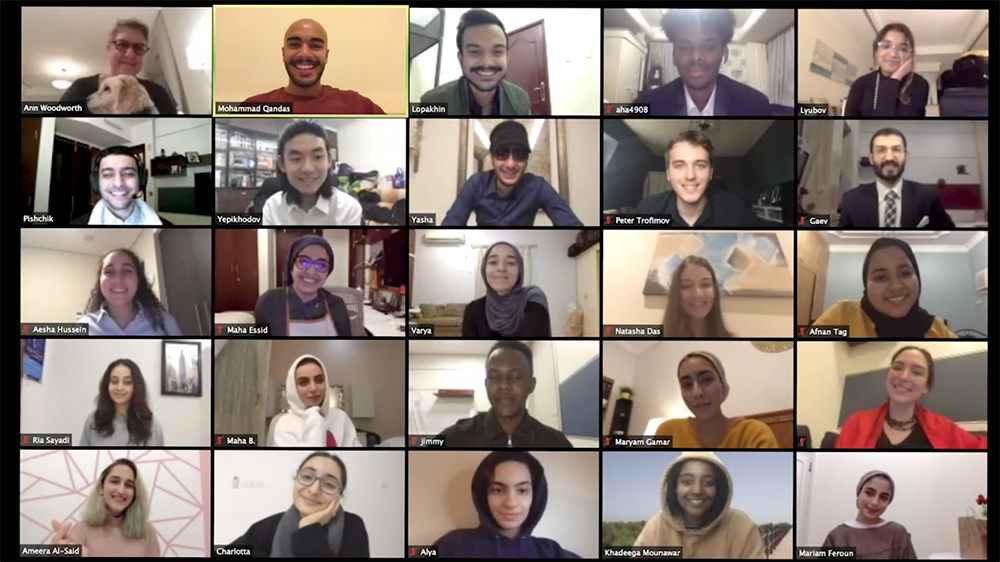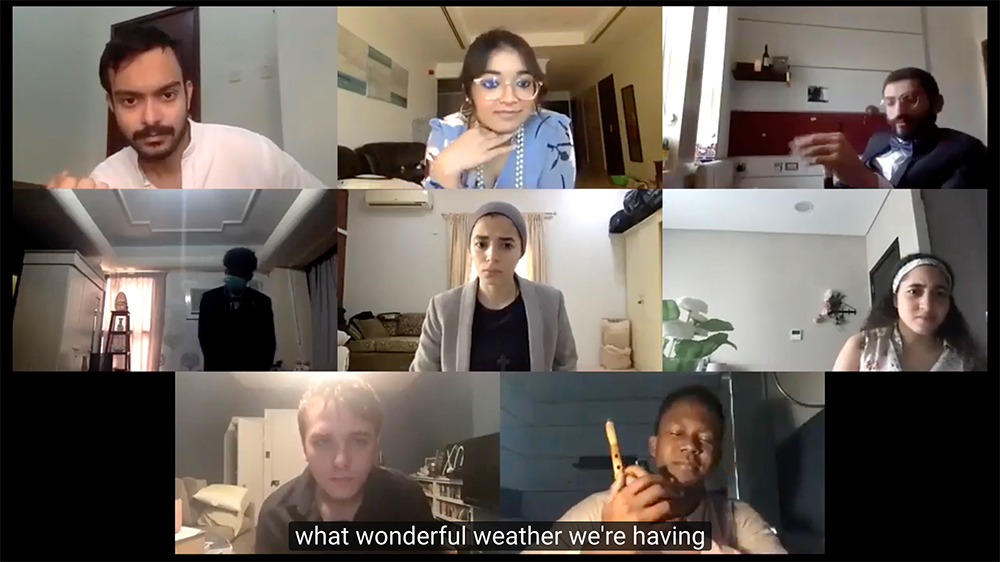A stage play—The Cherry Orchard—originally designed as a live production in NU-Q’s Black Box Theater, was produced online following the move to remote teaching, accentuating the role and urgency of live theater among actors and directors.
The production, which captures the spirit of an artistic home swept by the currents of technological advancement, is a 21st-century adaptation of Anton Chekov’s 1904 play where a Russian aristocratic family is on the brink of losing their estate to powerful historic forces at the turn of the 20th century.
“Unexpectedly, the play really became a reality,” said play director Ann Woodworth, associate professor at NU-Q. “When I think about this experience, it amazes me because I couldn’t have done the project without the technology, so the irony of that is not lost on me.”
With more than 45 years of experience in the industry, Woodworth is no stranger to “old-worlds giving way to new worlds,” having lived through radical disruptions in theater caused by expansions in film and television. “This experience confirmed my belief that there’s something so fundamentally necessary in being human—of being together, and experiencing things together,” she said.
Earlier in the semester, Woodworth spent several weeks with 22 students from her performance-based course, “Creative Collaboration,” conducting research; casting characters; developing dynamic storylines; and building a stage. “I think that’s why everybody was excited—because all of this work had finally gotten to the point where now we could just dig in and make the play happen,” she explained.
For the students, the interruption of that journey after spring break, when the decision was made to shut down all schools and universities in Qatar, was responsible for both technical and emotional difficulties. “The transition to an online platform lacked the real feel of acting and excitement at the beginning, as our homes are not the perfect spaces for such a thing,” said Sahar ElKabbash.
ElKabbash also expressed a common sentiment shared among her peers in the class who were in their last year at NU-Q. “We were especially attached to the live performance because many of us are seniors and this is our last play with Ann,” she said, while others added that it was the only opportunity they could find to join the popular class before graduating.
Despite these setbacks, the work of adjusting the play to the needs and language of an online audience, starting with renaming the project to The Cherry Orchard–QUARANTINED, was a rewarding process for the group in and of itself. “That was a very freeing moment actually,” Woodworth noted.
“Once we said it out loud—once we titled the play with that term—then I think it was easier for all of us to kind of embrace the project in the direction that it was going, rather than continuing to fight to make something happen that was only going to happen in a live theater.”
In addition to putting a virtual show together, which premiered on April 25 and can be found here, students who felt constrained by the restrictions found additional ways to channel their creativity, including a documentary of their experience; an original 10-minute play based on the third act of The Cherry Orchard; and video essays about the movement work surrounding the production.
“As we switched our gears to different ones, new projects started to emerge,” said sophomore Afnan Tag, who proceeded to build a website where all these creations can continue to live online. “I decided to take this role because I wanted to create something that puts things together—something that would leave a fingerprint in some form to the people who see it.”
Reflecting on this experience, Tag notes: “I was surprised I am this attached to The Cherry Orchard, to the team, and to the Black Box. Then I realized that it’s because of this attachment that I was able to feel inspired again and continue to move forward with the new approach; it made me as excited as I was before the crisis.”
With several responsibilities in the project—including stage manager, dramaturg, writer, website designer and lighting specialist—Tag had a unique vantage point over the team’s creative evolution. “The more limitations we had, the more creative we got,” she explained. “This whole project would have been something so different today, but the fact that we didn’t have a physical space anymore meant that we had to work with the limitations we had. It changed it all.”
Muhammad Muneeb-Ur-Rehman, a senior who had not had the chance to take Professor Woodworth’s Creative Collaboration class in the past, and was hoping to learn from her creative process of working with actors and creating specific scenes, said: “I still got to learn a lot, and maybe even more since what I learned had to be done digitally.”
Woodworth, who launched Creative Collaboration shortly after joining NU-Q from Northwestern in Evanston in 2009, is concluding her career with Northwestern this year, giving this particular production even more importance to her and her students.
“It all came together by the collaboration and our genuine love for Ann Woodworth,” ElKabbash said. “Personally, I needed this play to happen even as an online performance because graduating wouldn't have been the same if we didn't have one last Ann production.”


